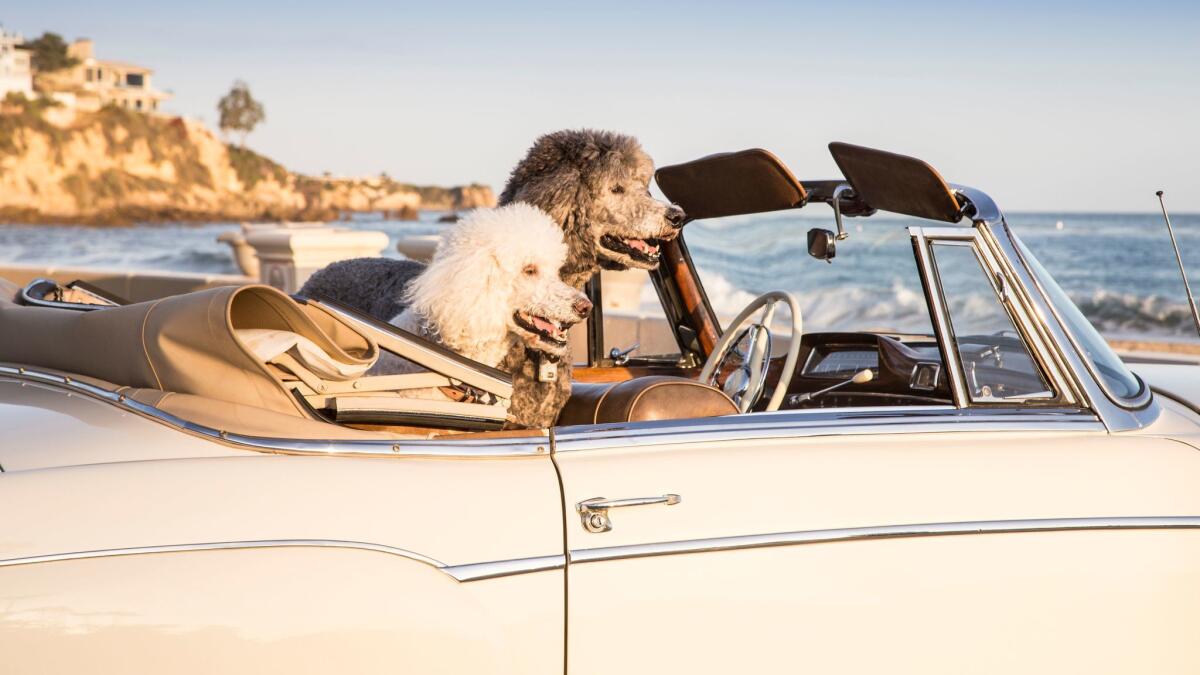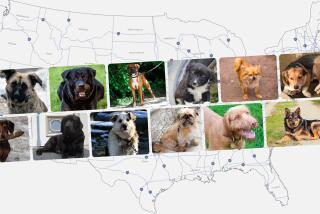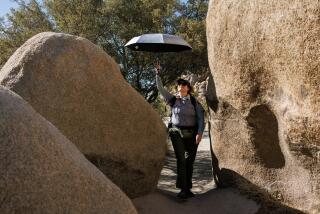Keeping your dog happy and healthy when you’re both on vacation

- Share via
My dog, Piper, is a white fluffball, a 20-pound rescue pup who prances around like a pint-sized princess and greets me with a play bow and kisses when I come home.
Imagine my surprise when my fair-haired girl locked me out of the car in the middle of the desert one recent night. She had the cellphone, my purse and the car keys. I had a disbelieving look on my face.
We had gotten off Interstate 8 at a rest stop outside El Centro, near the Mexican border. I walked Piper, put her back in the car and was walking to my door when I heard the electronic locks snap. I grabbed the door handle and pulled, but it wouldn’t budge.
Your ultimate guide to planning the best summer road trip »
Piper was standing on the car key fob. I had apparently dropped it when I lifted her into the car.
The story ends happily, thanks to a CalTrans worker who loaned lent me his phone to call a roadside service with a locksmith.
But it scares me to think what would have happened if it had been daytime — and hot — or if someone hadn’t helped me.
The experience offers a lesson in what not to do on a road trip with your pet.
Thankfully, snafus such as this aren’t common.
You’re much more likely to confront stress and carsickness when you take your pup on a road trip, said Dr. William Ridgeway, a vet at Long Beach Animal Hospital.
“Those winding roads to Big Bear can be tough on dogs that aren’t used to traveling by car,” he said.
His advice: “Take them around the block in the car. Get them used to it.
“If you take several small trips and build up, you’ll find out if your dog’s ready to go on a longer trip.
“If motion sickness if a problem, there are medications similar to Dramamine for pets.”
Other tips:
Don’t feed your dog for a few hours before you leave, Ridgeway said, and walk your pet before you depart.
Many experts, including Ridgeway, recommend using a harness for your dog (or crating it) while traveling in the car.
“A dog is more comfortable if it’s restrained because it doesn’t get slammed into corners every time you go around a curve,” he said.
Don’t let your dog sit in the passenger seat or on your lap. In a collision, the air bag can injure or kill your pet, according to the American Veterinary Medical Assn.
Other possible problems: Small dogs may jump into the driver’s footwell, interfering with braking and acceleration; big dogs may lean across the driver, blocking the view of the highway.
Take regular breaks on the road, stopping for 15 to 30 minutes every three to four hours. Allow enough time for your pet to explore the unfamiliar territory. If possible, find a dog park or other pet-friendly attraction.
Remember your dog is wearing in a fur coat. Don’t ever leave it in a parked car in the heat for even a few minutes. Hundreds of dogs die each year in parked cars, even with the windows open. Temperatures can climb 20 degrees in the first 10 minutes. Your dog could suffer heatstroke and die.
When you pack for your trip, don’t forget to pack for your four-legged pal. Take rabies vaccination records, if you’re crossing state lines, and other vaccination records if you plan to board it along the route (while you visit a no-dogs attraction for a day, for instance).
Carry your vet’s contact information.
Other doggy necessities: ID tags with your mobile number, pet food (you may not be able to buy the type his digestive system is familiar with), a bowl, leash, doggy pickup bags, medications, a favorite toy and bed or blanket for sleeping.
Apply flea medications before leaving home.
Consider the climate where you’re traveling. Some dogs don’t cope well with heat, especially short-nosed breeds. Others can get sunburned.
Check ahead to make sure you can find good accommodations that will accept a dog. Also consider whether you’ll have time to spend with your dog. If not, it might be better to leave it at home.
Remember, most hotels won’t allow you to leave a dog in your room while you’re gone. You’ll need to take him with you or arrange for a pet sitter, whether that’s someone you hire or a family member.
Camping trips may seem ideal, but keep in mind that some national park sites don’t allow dogs; many don’t allow them on trails. Call or check websites using our national parks list of the West.notliveyet
Once you arrive, try to maintain a similar schedule to the one you have at home, feeding and walking your dog at consistent times.
Most of all, have a good time. And keep track of your key fob.
MORE ROAD TRIPS
Your ultimate guide to planning the best summer road trip
In the Mojave Desert, a winding route reveals the weird and the wonderful
On a road trip, love means always having to say you’re sorry and other lessons learned
You can’t take a road trip without pit stops. Here’s the lowdown on 7 spots
More to Read
Sign up for The Wild
We’ll help you find the best places to hike, bike and run, as well as the perfect silent spots for meditation and yoga.
You may occasionally receive promotional content from the Los Angeles Times.






